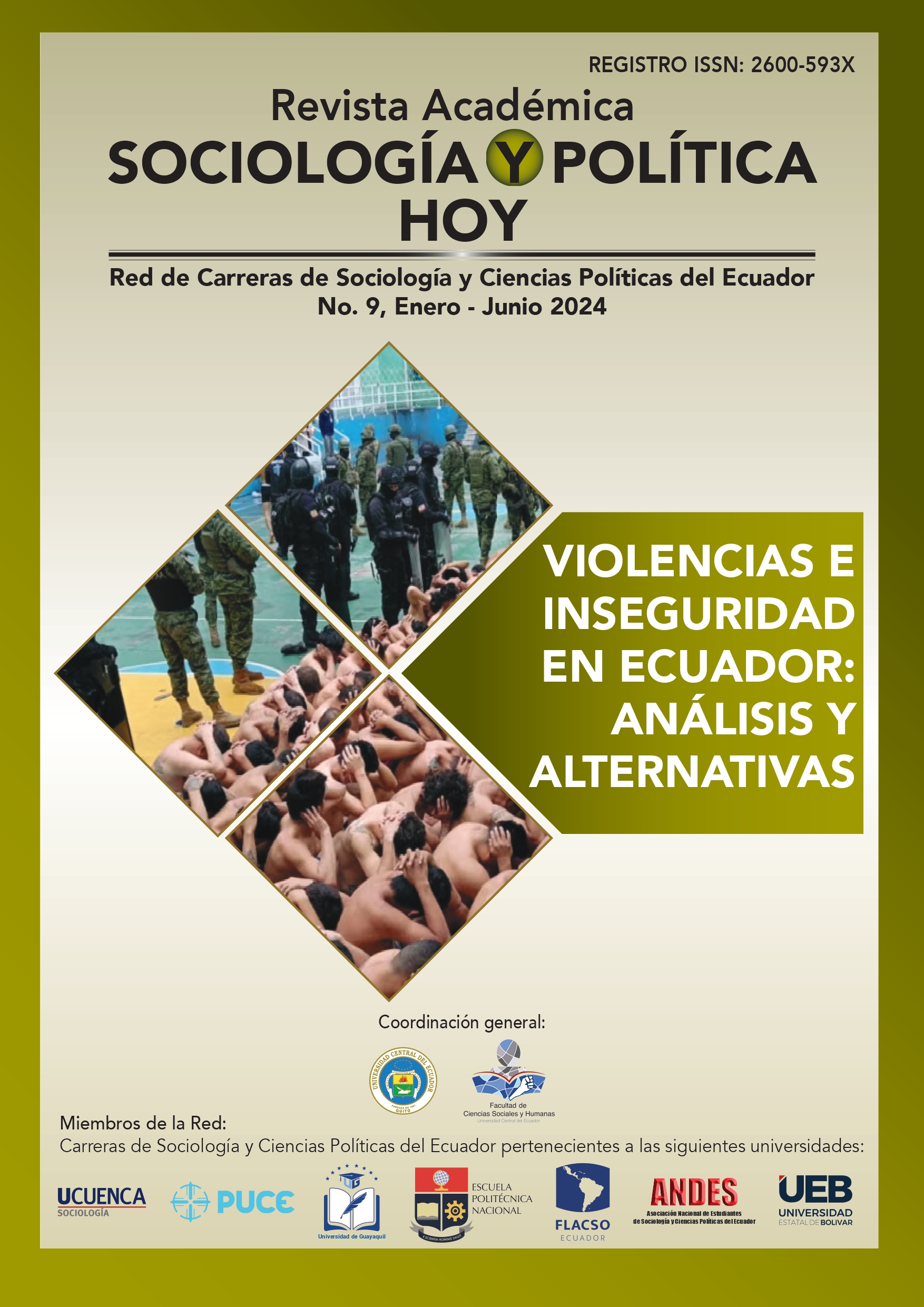On criminal governance, resilience and comprehensive security strategies
Keywords:
governance, criminal governance, systemic security management, comprehensive security, resilience, violence prevention at the state and community levelAbstract
It is about thinking, from a social sciences perspective, about the content and differences between the forms of violence that arise in contexts where criminal economies are prevalent, as well as the pre-social primordial condition of violence. Its control through cultural processes has depended and continues to depend on the possibilities of building agreements and consensus. This article explores the use of the concepts of Governance and Resilience through recent studies on criminal networks. It contrasts the historical experience of violence control, which was predominantly based on military force until the late 20th century, with the more recent developments in constructivist and systemic theories of Security with a social focus. These developments have led to methodologies for building Resilience based on strengthening institutions and social fabric, as proposed by the “Global Initiative against organized crime”.
Metrics
References
Alda Mejías, S. (2021). La cultura del privilegio y la privatización de las funciones públicas, elementos esencial¬es para la gobernanza criminal. En S. Alda Mejías (coordinador). Los actores implicados en la gobernanza criminal en América Latina. Real Instituto Elcano; Fundación Friedrich Naumann.
Arias, E. (2017). Criminal enterprises and governance in Latin America and the Caribbean. Cambridge University Press.
Buzan, B. 1981. Change and insecurity: A critique of strategic studies. En B. Buzan & R.J. Barry Jones (Eds.), Change and the study of international relations: Theevaded dimension (pp. 155-172). Londres: Frances Pinter.
CONACYT, Centro Geo y Data Lab. (2020). Presencia criminal en México 2020. https://ppdata.politicadedro¬gas.org/#PPD.GC
Excelsior (30 de mayo de 2018). Cartel Jalisco Nueva Generación tiene extranjeros adiestrados: Sandoval. Excelsior. https://www.excelsior.com.mx/nacional/cartel-jalisco-nueva-generacion-tiene-extranjeros-adiestra¬dos-sandoval/1241897
Ferreira, M. A. (2022). Organizações Criminosas e Governança Híbrida na América do Sul: o contexto da COVID-19. Relaciones Internacionales, 95(2), 117-138. https://doi.org/10.15359/ri.95-2.5
Ferreira, M. A., & Gonçalves, A. B. (2022). Criminal governance and systems of parallel justice: practice and implications in Brazilian urban peripheries. International Journal of Law, Crime and Justice, 68, 100519. https://doi.org/10.1016/j.ijlcj.2021.100519
Ferreira, M. A., & Richmond, O. P. (2021). Blockages to peace formation in Latin America: The role of crim¬inal governance. Journal of Intervention and Statebuilding, 15(2), 161-180.
Garland, David, 2001, La Cultura del Control. https://es.scribd.com/document/650597682/Garland-D-2001-La-Cultura-Del-Control-Pp-163-165-y-171-178-1
García Gallegos y Chuquimarca Mosquera (2010) Caso Intag en: Redes Ilícitas y Política en América Latina. Idea Internacional. https://www.idea.int/publications/catalogue/illicit-networks-and-politics-latin-america?lang=es
García Gallegos Bertha J. 2015, La situación de seguridad en el Ecuador. Políticas y estrategias en un nuevo marco de interpretación URI: http://pucedspace.puce.edu.ec/handle/23000/4857
INFOBAE, Gonzalo Solano, Enero 10, 2024 ¿Por qué estalló Ecuador: la guerra de bandas detrás de una escalada de violencia sin precedentes . https://www.infobae.com/america/america-latina/2024/01/10/por-que-estallo-ecuador-la-guerra-de-bandas-detras-de-una-escalada-de-violencia-sin-precedentes/
Global Peace Index 2023 (Institute for economics & peace, 2023) https://reliefweb.int/report/world/global-peace-index-2023?gad_source=1&gclid=EAIaIQobChMIgJTKgfyDhQMVY4BaBR0exwRfEAAYASAAEgLIuvD_BwE
Índice Global de Resiliencia, 2021, The Global Initiative Against Transnational Organized Crime, 2021 CRIMEN ORGANIZADO-INDICE GLOBAL-2021-global-ocindex-report-spanish.pdf
Global Iniciative Cuaderno de Trabajo, 2022. https://globalinitiative.net/wp-content/uploads/2022/09/20220902_OCIndex-Workbook.pdf
Lessing, B. (2020). Conceptualizing Criminal Governance. Perspectives on Politics, 1-20. https://doi. org/10.1017/S1537592720001243
Lee, 2021, Climate Change 2021: the physical science basis. Contribution of Working Group I to the Sixth Assessment Report of the Intergovernmental Panel on Climate Change; …
Madrigal, A. (2019). La minería criminal en los países andinos: caracterización de un fenómeno de seguridad regional. Informe de investigación. Universidad Andina Simón Bolívar.
Mongabay, periodismo ambiental, 2024. https://es.mongabay.com/
Niño César, 2022. Legitimidades y contra legitimidades en la Amazonia Colombiana; lecturacrítica de la Seguridad. En García y Alda, 20233 El Estado bajo asedio del crimen roganizado 2022, PUCE RIE Quito PUCE Ed. 2022. https://www.academia.edu/75650252/Legitimidades_y_contra_legitimidades_en_el_Amazonas_colombiano_una_lectura_cr%C3%ADtica_de_la_seguridad
Rivera-Rhon @ Bravo-Grijalva (2003) Gobernanzas criminales y enclaves productivos de la minería ilegal en Ecuador, en Revista Logos Ciencia & Tecnología,, ISSN 2145-549X, Vol. 15, Nº. 2, 2023.
OEA. Consejo de Seguridad Hemisférica, 2003. Declaración de la Seguridad de las Américas.https://www.oas.org/36ag/espanol/doc_referencia/DeclaracionMexico_Seguridad.pdf
ONU. 2002. Estatuto de Roma de la Corte Penal Internacional* https://www.un.org/spanish/law/icc/statute/spanish/rome_statute(s).pdf
Sampó C; Jenne, N., & Ferreira, M. (2023). Ruling Violently: The exercise of criminal governance by the Mexican Cartel Jalisco Nueva Generación (CJNG). Revista Científica General José María Córdova, 21(43), 647-665.
SAMPO C. (2021) Una aproximación teórica, el concepto de Gobernanza Penal. En Alda, Sampó 2021. En Sampo y Alda (2021) Los actores implicados en la gobernanza criminal en América Latina Editorial: Real Instituto Elcano.
Weber, Max, Conceptos Sociológicos Fundamentales, México, Fondo de Cultura Económica, 1930
Villa, R., De Macedo Braga, C., & Ferreira, M. (2021). Violent Nonstate Actors and the Emergence of Hybrid Governance in South America. Latin American Research Review, 56(1), pp. 36-49. https://doi. org/10.25222/larr.756
Williams, P. (2008). Violent non-state actors and national and international security. International Relations and Security Network. https://www.files.ethz.ch/isn/93880/VNSAs.pdf
Downloads
Published
How to Cite
Issue
Section
License

This work is licensed under a Creative Commons Attribution-NonCommercial 4.0 International License.
Esta obra está bajo una licencia internacional Creative Commons Atribución-NoComercial 4.0.









